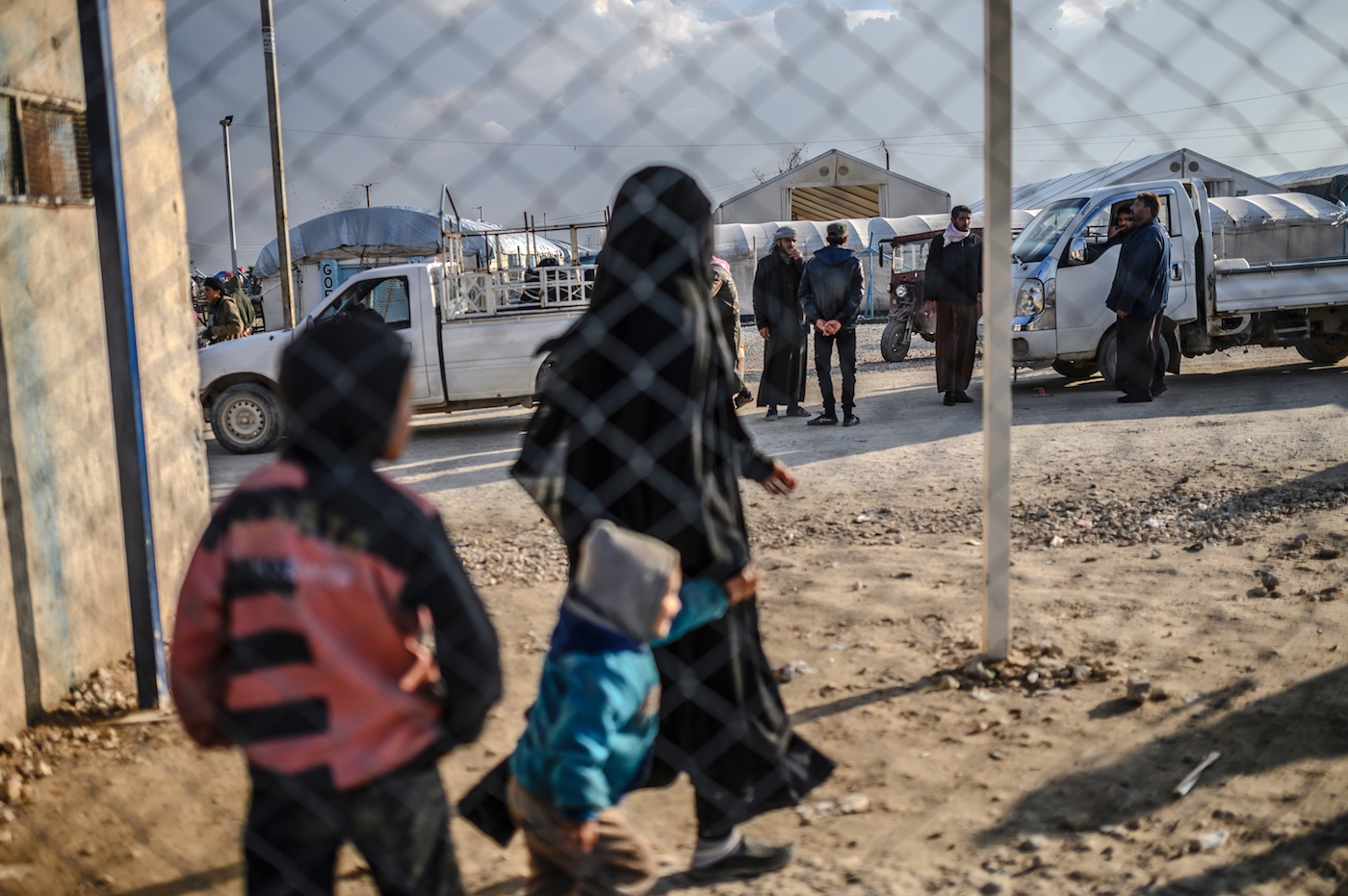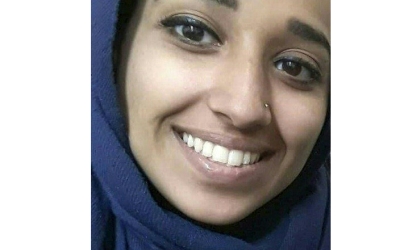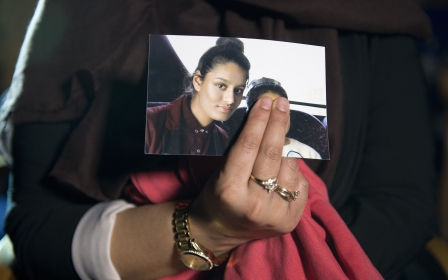Trump exerting 'too much power' by barring IS supporter from returning, lawyer says

As the United States pushes forward with its plan to withdraw most of its troops from Syria, pressure has increased on President Donald Trump's administration to lay out a clear plan for how it intends to deal with American citizens who joined the Islamic State (IS) group in Iraq and Syria.
While only 64 US citizens successfully joined the militant group, according to a 2018 report by George Washington University's Program on Extremism, there has been no clear directive from the White House on their repatriation, prosecution or otherwise.
And this, despite the fact that some Americans have publicly pleaded to come home.
“If they aren’t brought home, what happens to them very much depends on who captured them and what their policies are," said Daniel Byman, a senior fellow at the Center for Middle East Policy at the Brookings Institution and a counter-terrorism expert.
'I understand people are tempted to say these people did something brutal and horrible and they should not be allowed to return, but that is what our justice system is for'
- Daniel Byman, Brookings Institution
He told Middle East Eye he thinks repatriation is the safest option, as former IS members can then be prosecuted in their home countries, including the US.
New MEE newsletter: Jerusalem Dispatch
Sign up to get the latest insights and analysis on Israel-Palestine, alongside Turkey Unpacked and other MEE newsletters
"I understand people are tempted to say these people did something brutal and horrible and they should not be allowed to return, but that is what our justice system is for," he said.
But Byman said he is concerned that countries instead may allow their citizens to be dealt with on the ground in Iraq, Syria and elsewhere.
"There's a real question of whether they'll face justice with a real rule of law. Some might be able to bribe their way out, others may try to find places to flee if they aren't allowed to go back to their home country and spend years in prison," he said.
"A group of hundreds of people unable to go home hiding out who knows where with links to the Islamic State - that's a very scary possibility."
US pushing allies to repatriate IS members
The US has called on its allies to take back about 800 of their citizens currently held in Syria by the Syrian Democratic Forces (SDF), a US-backed, Kurdish-majority militia.
Still, some have stated they have no interest in repatriating their citizens, while others, including the United Kingdom, have stripped some people of their citizenship.
British teenager Shamima Begum, who left the UK for Syria in 2015 at age 15, was "deprived" of her citizenship earlier this week.
The British government has argued that Begum can seek Bangladeshi citizenship. Her family and lawyer say the UK's decision has rendered her stateless. Bangladesh has also since refused to give her citizenship.
Unlike the UK, the US has no legal mechanism to strip someone of their citizenship without their consent.
Still, Hoda Muthana, a 24-year-old born and raised in the US, is now in a situation similar to Begum's. She left the US in 2014 to join IS, but she now says she regrets her actions and wants to come home.
That was rejected this week by Trump himself and US Secretary of State Mike Pompeo, who said in a statement on 20 February that Muthana "is not a US citizen and will not be admitted into the United States".
The US government claims Muthana was born in the US while her father was still a diplomat, making her ineligible for US citizenship, which is granted to anyone born in the country, save for a few special circumstances. Her family and lawyer say, however, that her father wasn't a diplomat at the time of Muthana's birth.
"This is essentially an exercise of executive power to strip someone of citizenship without any process, just by their own assertion that they think some paperwork wasn't right," said Muthana's family lawyer, Hassan Shibly.
"That is way too much power for one office to wield, and it is not acceptable in the United States of America," Shibly told MEE in an interview near his office in Tampa, Florida.
Muthana's family on Thursday filed a lawsuit challenging the US government's claims regarding her citizenship status. If they lose their claim, Muthana will by default become a stateless person.
Attempt to end US birthright citizenship?
For his part, Byman ruled out the possibility that ex-IS members may be tried at an international tribunal, should their home countries refuse to repatriate them.
"It would leave us with the same question. Say they were tried by an international tribunal and found guilty, where would they be imprisoned? It won’t be an option," he said.
'I think all of this is absolutely connected to the idea that Trump wants to end birthright citizenship as we know it'
- Hassan Shibly, Muthana's family lawyer
However, just how the Trump administration intends to deal with American IS members looking to return to the US remains unclear.
On 20 February, the US president tweeted that he had instructed Pompeo not to allow Muthana to re-enter the country.
Trump also has speculated in recent months about the possibility of sending foreign fighters to Guantanamo Bay prison in Cuba.
In 2015, in leaked talking points ahead of a Republican Party debate, he also addressed the question of closing the infamous prison facility. "No," Trump's talking points read. "I would also take away the passports of Americans who fight for ISIS and send them to Gitmo for some R&R."
Byman said that would be unlikely, however, because while "Guantanamo is a logical possibility ... I just don't think it's one politically that Trump would want to do".
He said there was no "political will" in Washington to take in other country's prisoners. He also pointed to an April ruling by a US federal court judge, which barred the government from allowing US citizens to be detained at the Guantanamo facility.
About 12 US citizens who successfully reached Iraq or Syria to join IS have been caught, repatriated and prosecuted, while a few hundred more were stopped and charged before they made it far enough to join the group, according to experts at George Washington University’s Program on Extremism.
Currently, dozens of other foreigners, at least 13 of which hold US citizenship, are being held at the same Kurdish-controlled refugee camp in Syria as Begum and Muthana, according to the New York Times.
The newspaper reported that almost all of the 13 US citizens are women and children.
Shibly, Muthana’s family lawyer, told MEE that if the US does not repatriate and prosecute such women, it is essentially giving them "a free pass" for their crimes.
Shibly also accused Washington of using cases like Muthana's as a political tool to change US citizenship rules - and undermine birthright citizenship more specifically.
"I think all of this is absolutely connected to the idea that Trump wants to end birthright citizenship as we know it," Shibly said. "He wants to radically change it with an executive order, and I think this whole thing is him trying to set precedent for him to be able to do so."
Middle East Eye delivers independent and unrivalled coverage and analysis of the Middle East, North Africa and beyond. To learn more about republishing this content and the associated fees, please fill out this form. More about MEE can be found here.




